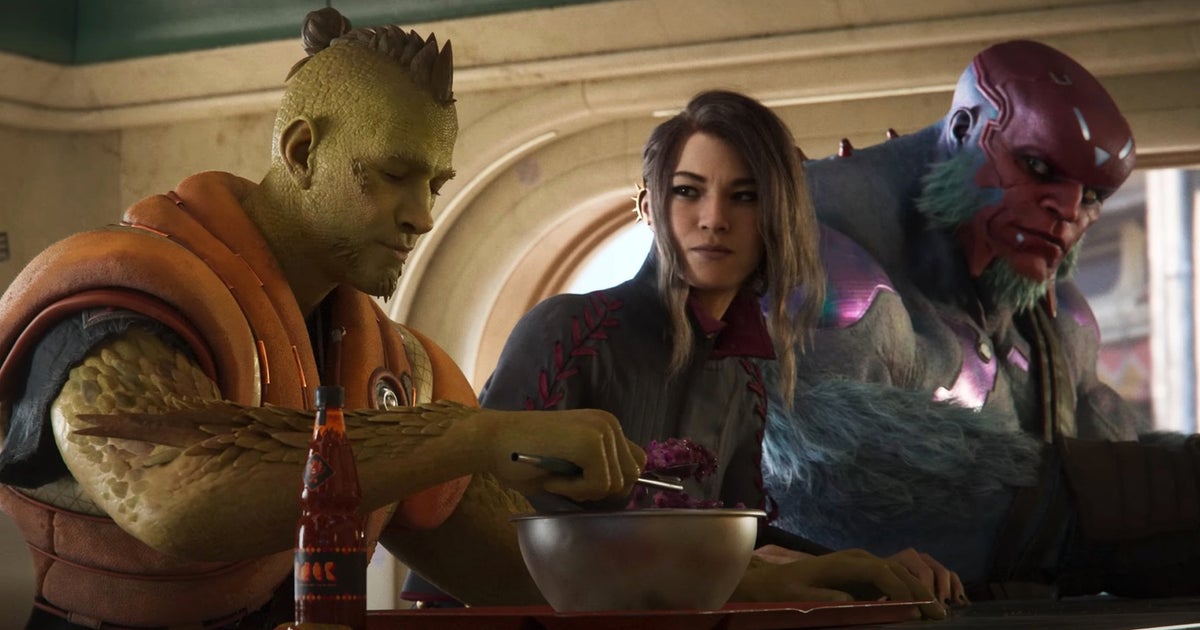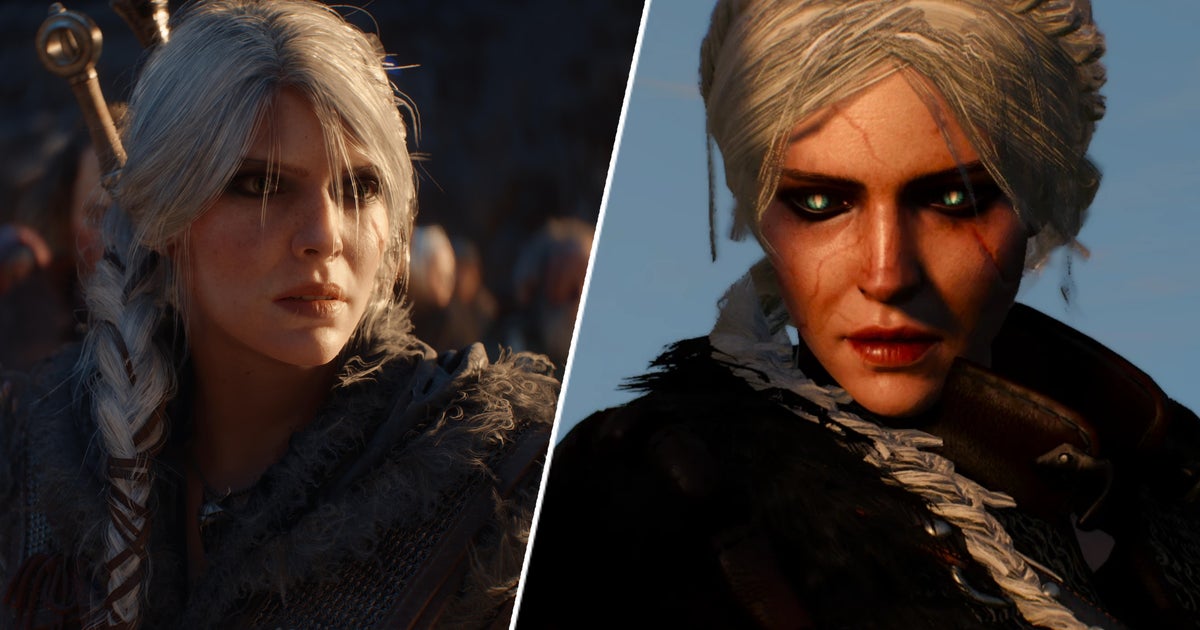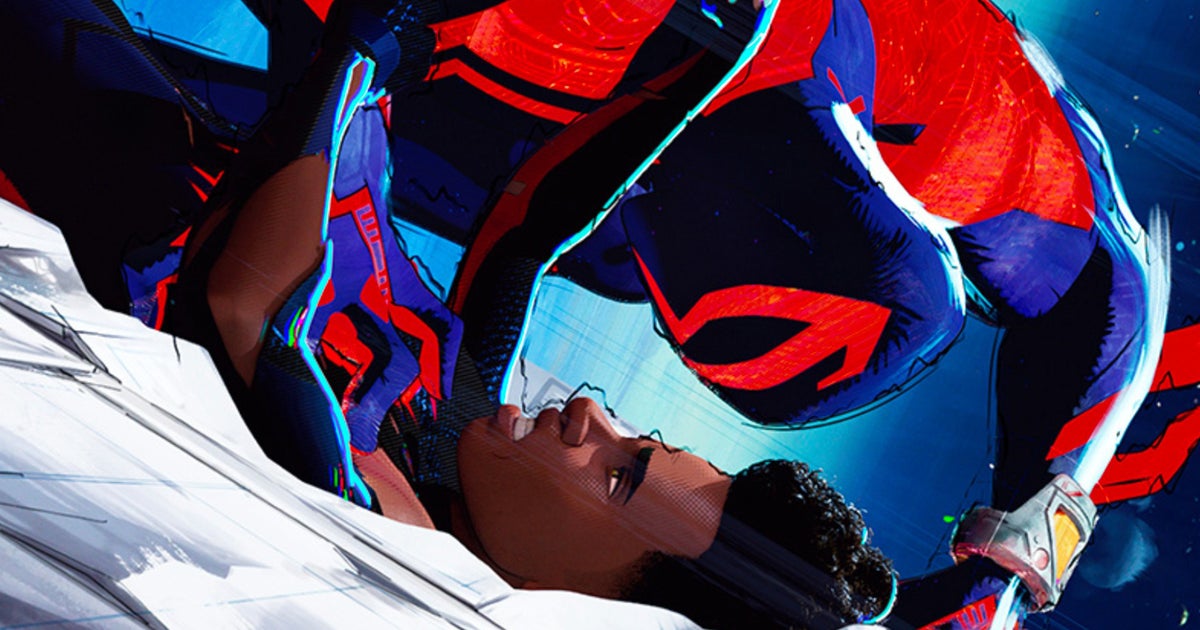Throughout Metaphor: ReFantazio’s roughly 80 hours, the RPG’s protagonist carries a novel with him as he travels through the fantastical world of the United Kingdom of Euchronia. The book depicts an idealized metropolis of skyscrapers where equality is written into law. It’s clear this story envisions a pristine vision of our own world, and as our hero reads through its pages, he’s filled with a drive to try and make his world a place that mirrors the fantasy the author created. I’m no stranger to throwing my heart and soul into the stories I devour in fiction, so Metaphor: ReFantazio had me by the throat in mere minutes.
The latest game from the minds behind the Persona series has a lot to say, and it does so in a way that’s refreshingly full-throated and without a modicum of subtlety. Metaphor takes the foundations of Atlus’ beloved life sim RPGs and manages to do and say almost everything it sets out to more eloquently than the games it builds upon. It’s not flawless like the utopia in the novel, but it’s a relief to get a game from Atlus that I can recommend without the same caveats I typically have to attach to Persona games, which gives me hope for the company’s future projects, both in and out of this new, rich world it’s created.
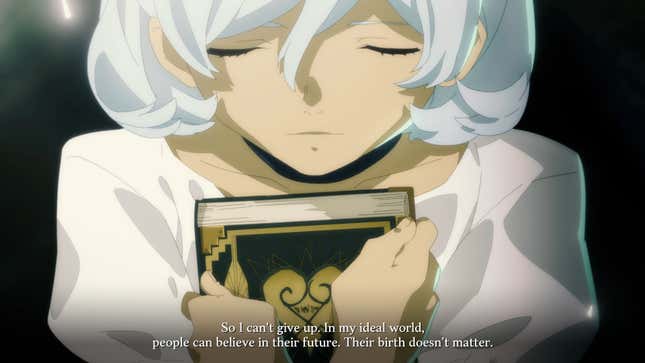
Despite what Atlus would like you to believe, Metaphor: ReFantazio is a dense, overtly political tale, and the happenings within the United Kingdom of Euchronia serve as an allegory for the injustices and prejudices of the real world. This universe’s people are made up of eight “tribes,” each a different humanoid race with its own cultures, traditions, and stereotypes that play into their perceived roles in society. The protagonist, an Elda, is a perfect centerpiece for illustrating this, as his tribe is one that has historically been put down under the current world order.
Metaphor is heavy-handed as it draws attention to the power dynamics of its world. As I enter the capital city of Grand Trad, I see a beast-like Paripus begging for their life as they’re executed on the town square without trial. No one believes a paripus when they say they didn’t commit a crime, and no one with the power to execute them cares enough to look a little harder when an easy scapegoat is right in front of them. To the horn-sporting Clemar and the elf-like Roussainte that watch, it’s merely entertainment. As an Elda, the most despised tribe in all the land and the one blamed for the monstrous “human” creatures that threaten the safety of their betters, it’s a reminder that one perceived step out of line could lead to a quick, uncaring end.
Atlus has never been one for mincing wor as it creates, well, metaphors for real-world plights. However, instead of using the supernatural as it does in Persona, in Metaphor it creates a dystopian fantasy that mirrors reality. A recurring motif throughout the game sees the protagonist reading the novel he carries with him, as it illustrates a vision of what the world could be, powerfully contrasted with the reality of how it is. Of course, moving closer to a utopian reality is hardly a simple matter, and anyone who lives in this hellscape we all share has probably considered that achieving lofty ideals of a world without prejudice and injustice, where humanity is “one tribe” truly devoid of discrimination and oppression, would likely also mean erasing foundational cultural history. Metaphor doesn’t seem blind to this, and characters sometimes point out this conundrum. When I showed the book to the Eugief Heismay, for instance, he pointed out that the novel’s vision of what a utopia would look like seemed doomed to fail and full of blind spots. But can we still aspire to it? That’s the goal.
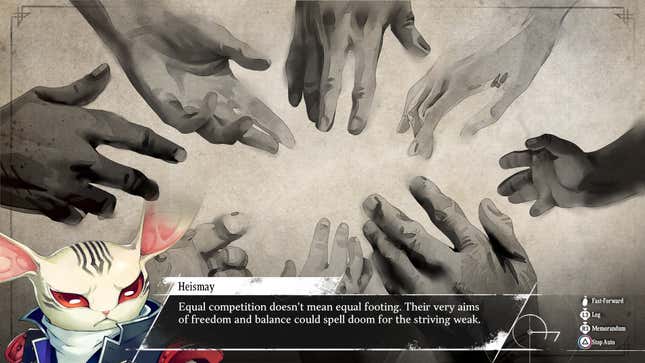
Metaphor is simultaneously a story about people who want to make their world a better place, and an ideological statement about the importance of such struggles, one that offers up more actionable ways to live by such an ethos than the similarly themed Persona 5 did eight years ago. It has its fantastical elements, but the game’s tale of people banding together with anyone willing to stand up for what’s right feels remarkably grounded. At the core of Metaphor is an election, one not determined by checkmarks on a ballot, but by a magical force that sees into the heart of every citizen of Euchronia. The game opens with a bed-ridden king being assassinated by antagonist Louis Guiabern, a prominent member of the Euchronian military who seeks to ascend to the throne, unhappy with the royal family’s rule. However, his plan is derailed by a spell left behind by the king in the wake of his death. His magic covers the entirety of the country and ensures that the people will be led by someone they actually choose, so no one can take the throne by force. It prevents political assassinations, so the only way to win is to actually gain the favor of the public.
That’s where Metaphor’s spin on Persona’s social mechanics comes into play. The relationships I foster across the country help solidify my place in the election, and ensure Louis is unable to comfortably ascend the ranks despite all his underhanded schemes and efforts to secure victory. As a political drama, Metaphor understands that a path to political prominence starts at the ground level, and that those in power routinely forget those at the bottom. By the time those vying for Euchronia’s crown have ascended to the highest ranks in the election, they’ve already forgotten the average citizen who put them there.
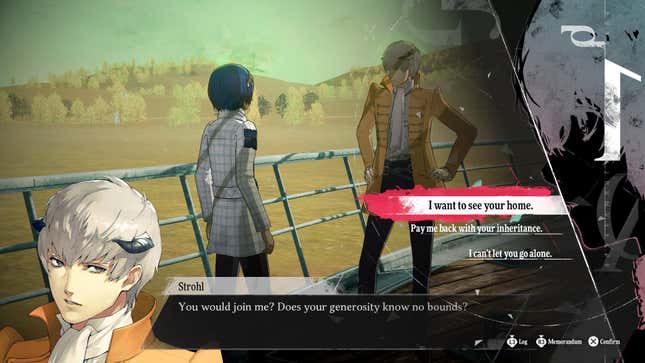
These political truths are driven home all the more effectively because Metaphor’s follower relationships are some of the best-written stories in Atlus’ catalog. In a way, the game feels like Persona with a more thorough editor. The social link-style relationship building brings down its conversations to a more brisk eight encounters rather than the bloated 10 of Persona games. Each follower I grew to know throughout Metaphor felt like they filled out the world and brought a new perspective I wouldn’t have considered without them. Also, there are only 14 of them, compared to the two dozen of Persona 5 Royal. The trade-off is that none of them felt like filler, and even the worst of them still felt like they had something to contribute to Metaphor’s themes. Maria, the young child of a soldier killed in action, brought the perspective of a child affected by this cruel world. Bardon, a local leader in the town of Martira, illustrated the challenges of working locally with people you know rather than having lofty goals of acquiring the crown.
The one dud I’d call out is Catherina, the Paripus bounty hunter who is also gunning for the throne. While I found her entertaining as a character, her arc takes a strange left turn that feels pretty at odds with the views Metaphor has expressed up to that point on how those in power have everyone else under their boot (and what ordinary people should do about it). For a game that doesn’t shy away from talking about how shitty things are for the poor and marginalized, Metaphor’s lapse in judgment on this storyline soured me on the relationship, even though it helped my place in the election.
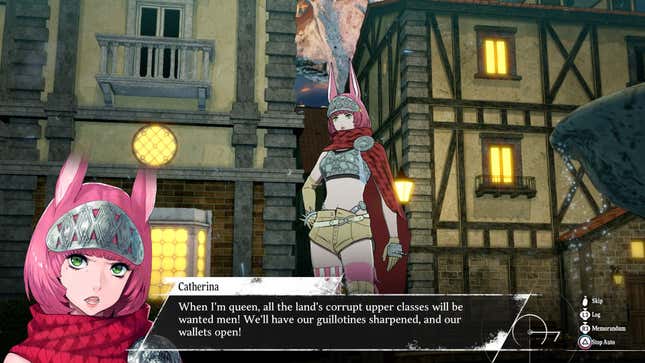
Navigating the social sim elements also means juggling the day-to-day. I had opportunities to take on bounties in my free time, which generally led me to one of several indistinct dungeons with a challenging boss at the end. But more often than not I’d use that time to go talk to the citizens of Euchronia. Metaphor uses the same social stats mechanic from Persona that blocks off dialogue options and relationship progress behind things like “wisdom,” “tolerance,” or “eloquence,” which can be leveled up by meeting people around towns and reading books.
Metaphor never passes up an opportunity to teach you more about its world by hearing from the people who have been most affected by it. Talking to a mask-wearing Mustari about their culture fills in gaps in my knowledge and also allows me to affect change for them in-game. Even when you’re doing actions just meant to pass the time, Metaphor takes Persona’s systems and fine-tunes them to build out its world, so that even on days where I didn’t feel like I was doing anything particularly productive or meaningful, I was still getting something significant out of spending my time talking to a guy I met on the street.
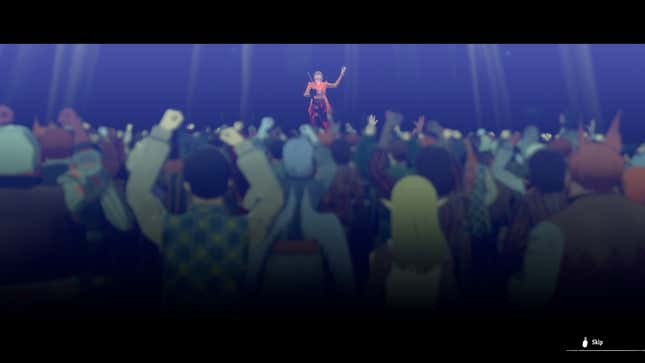
Winning the hearts and minds of the people is only half the battle, however. Though growing my relationships helps me build up my team into the best versions of themselves, my ascent to the throne is paved in monster blood. Metaphor: ReFantazio may not be explicitly a Shin Megami Tensei game (though there are references aplenty), but it’s got the same tough-as-nails DNA running through its veins. When I first played Metaphor, I wasn’t sold on its turn-based battle system which felt overly simple, a rote affair in which you just strike a weakness to do big damage rather than having the energizing complexities of Persona’s combat. However, as I unlocked new abilities and my foes did in kind, its complexities grew and I found its systems even more engaging than those of its predecessors.
For all the ways Metaphor better utilizes some of Persona’s core elements, it also tends to feel formulaic in some ways. The Persona summoning mechanic has been replaced by Archetypes, which are essentially classes that you can swap between throughout your journey. The cast goes through “awakenings” that are, nearly beat for beat, Persona 5 awakenings, complete with an emotional surge, a voice telling them they have found their true strength, and a gruesome scene of each hero ripping their heart out. Those scenes are sick, but it’s also pretty clear that this studio has a formula. That being said, Archetypes don’t operate the same way Personas do in combat, even if they come about through the same means. Anyone can be anything in Metaphor, even as some characters’ stats are clearly meant for specific roles. The Roussainte guardian Hulkenberg feels ripe for the tanky jobs, for instance, while the Mustari priestess Eupha is clearly meant for magic-based Archetypes. Throughout Metaphor I would keep characters in fairly adjacent roles to those they seemed designed for, but there’s freedom to branch out and spec characters into whatever role if you want to get your hands dirty and grind for it.
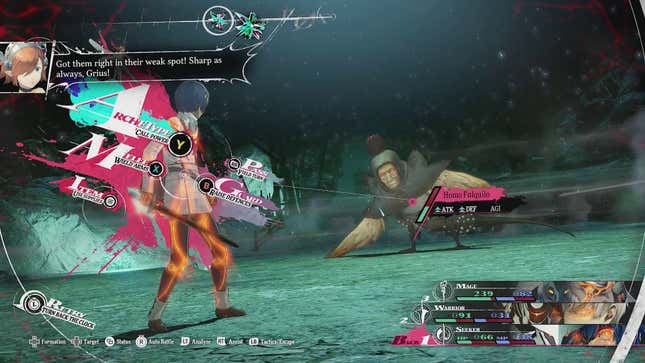
The sheer breadth of utility between Archetypes means Metaphor offers more room for player expression than the games it’s building off of. Support roles like the Commander make use of the frontline and backline mechanic, which allows you to make a tactical decision to give up defense or melee damage as you distance yourself from an enemy. Some Archetypes, like the Summoner and the Masked Dancer, feel a bit more gimmicky with their unique mechanics, the former able to bring new creatures into battle and the latter with its spell-casting masks to don. But there are also a lot of RPG mainstays like Warrior and Healer here, that keep you from getting too overwhelmed too quickly. Metaphor does a decent job of not handing you too much before you’re ready, so by the time that you have access to most Archetypes, you’ve got a strong enough grasp of how it all works to build a team that synergizes around them. The game encourages experimentation, though I would have liked to have seen that taken a step further by allowing you to pivot between Archetypes mid-battle, similar to Final Fantasy X-2.
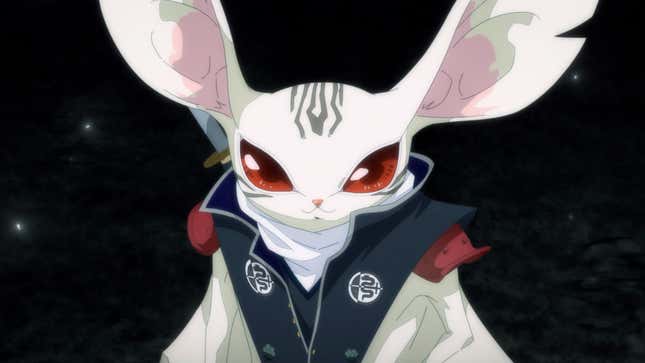
On its face, Metaphor’s turn-based battles may look simple. You look for an enemy’s weakness and exploit it, but unlike in Persona, the character who exploits that vulnerability doesn’t get an extra turn. Instead, doing so increases your team’s round of turns before you pass things over to your enemy. Managing your turns is the core mechanic that informs everything you do in a battle, as every action has a risk/reward to weigh, and you can lose actions for missing an attack, or have your round cut short if your attack is repelled back at your team. However, the same is true for your foes as well. Some of my favorite Archetypes and ability loadouts were focused on not only dealing damage to my enemies, but slicing their own action count in half. By the final stretch of the game, I had Heismay set up with a passive ability that would end my opponents’ turns if they missed an attack. When he started a fight with heightened evasion, I was handily beating some of the most powerful bosses in the game by denying them a chance to fight back. Metaphor’s Archetype system is full of exploits and strategies like this that only come if you take the time to find them.
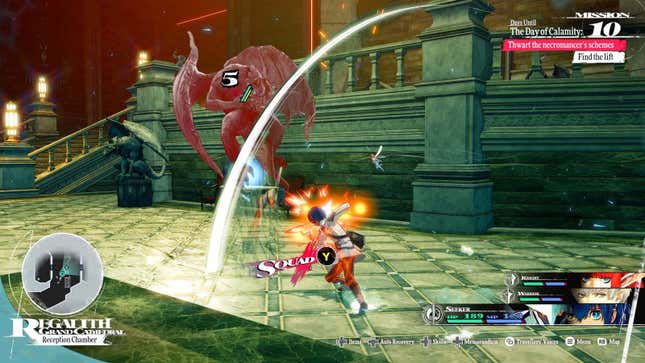
One of the best iterations on those systems, however, is in how Metaphor lets you avoid turn-based battles entirely for whole swaths of the game. Atlus has added an action system that lets you slash away at weak foes in the overworld and still get all the experience and rewards. Depending on your protagonists’ equipped Archetype, this can be more challenging, as your equipped weapon will determine if you have to get close enough for an enemy to hit back. But if you’re strong enough to take out an enemy on the field, you’ll save so much time without having to load into a turn-based fight and consider your tactics. Between multiple party members and Archetypes, Metaphor could have been a monotonous grind, but this one change makes Metaphor so breezy that I can’t even fathom Atlus doing away with it. I spent nearly 80 hours in this game, and I can only imagine how many more hours of just pure grind it would have taken to see credits if it weren’t for this change.
I’ve spent a lot of time comparing Metaphor to other Atlus games, but I think it’s fair to do so both because it clearly builds off Persona’s systems, and because it’s the first new franchise we’ve gotten from this team in some time. Systemically, sure, it gave me a lot to chew on and its turn-based combat feels like a compelling evolution of that in Shin Megami Tensei and Persona. But most of all, I keep coming back to how it manages to subvert the typical stumbling blocks of the team’s past work. There’s a scene early on in which Neuras, an older gentleman and the pilot of the group’s ship, is shown getting noticeably excited in the background while a famous young woman is greeting the party. I braced myself, expecting Metaphor to delve into the skeevy old man trope, only for him to barrel past her and geek out about her ship instead. While Persona 4 and 5 were about self acceptance and fighting for change, they still carved out time to belittle queer people and be shitty to women. Metaphor feels like a more mature story for this team, not because of its Game of Thrones-style dark fantasy, but because it doesn’t fall back into the unnecessary punching down I’d come to expect from them. As a story about fighting against injustice, Metaphor is mostly consistent in its ethos, even if it’s using its own fantasy social dynamics to explore those topics.
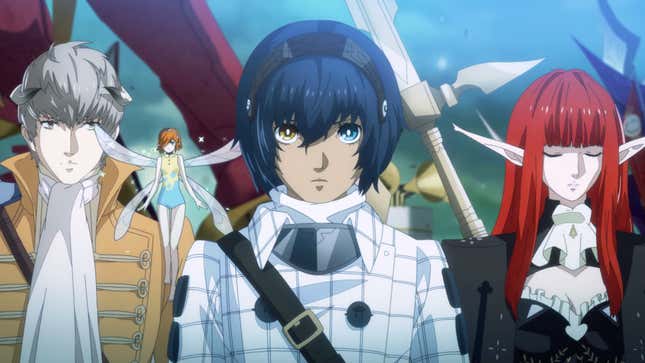
Those ideas are present in every scene and relationship, but they come up most pointedly every time the protagonist opens his fantasy novel. As he reads it alongside his newfound companions, each of them read aloud the ideals of the author. To most people who want to believe in a better world, nothing Metaphor has to say is necessarily surprising. It’s not groundbreaking for a story to show people who have been embedded in oppressive systems begin to crack when they’re shown a different way. It’s also nothing new for those who have been most affected by that oppression to point out that the idealized vision the most well-meaning people have about a better world is often naive. To those who have been fighting in one way or another, Metaphor will probably read like the Barbie monologue of progressive ideals. But it feels good to know that those values are still being touted when we need them most.
Metaphor feels like the game of the moment. Atlus may not want to draw direct comparisons between its own tale of a nation in the midst of a high-stakes election and the current American contest, but the way it shows how the average citizen experiences anxiety around the state of the world, believes their responsibility to address that state begins and ends with a vote, and then retreats into fiction while holding public figures to a higher standard than they hold themselves feels apt. These days, the moments in Metaphor that drive home our need to do more than blindly believe in those we put in power feel like the kind of wake-up call some people in the real-world need.
I don’t have any faith in politicians who prove time and time again they will default to the status quo, but then I look at how many people who claim to want change only care enough to do something every four years and my faith is once again dragged down. Those who would see injustice persist don’t rest, and it feels like even when the stakes are highest, so many people opt to simply drop their anxieties at the feet of a “good enough” politician and wash their hands of the world’s ills.
When the world seems overwhelmingly fucked, sometimes I look at the fictional versions of myself I’ve created in so many games, versions of me that had more power to bring about change in their worlds than I do in mine. Some days, I wish those visions of who I could be aligned with who I felt like I really am. As I’ve grown more disenfranchised with the world I live in, it’s become so much easier to turn to whatever hope fictional stories might offer rather than try to find any reason to hope things could get better in the world outside my window. Sometimes I find myself losing any optimism that the world can get better when the majority of people are either happy with the way things are or too apathetic to fight. That means it’s easier for me to just concern myself with the plight of fictional worlds, rather than dwelling on the problems facing this one. Sometimes I feel catharsis in stories like Cyberpunk 2077 that acknowledge everything is fucked and we’ll just survive it together. On other days, I need a reminder that other people want the world to be better and will fight for it, so I don’t fall into apathy myself.
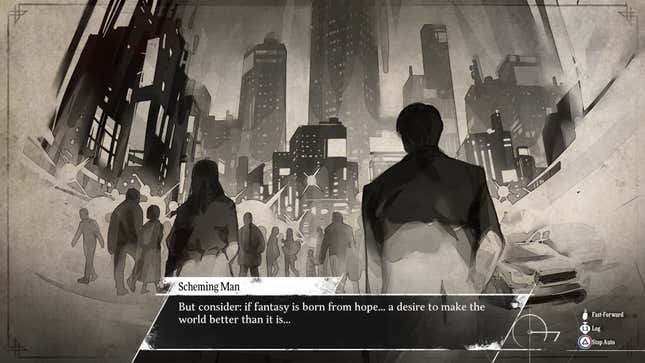
Metaphor does a succinct job of illustrating that progress is slow but still demands we take action, but the struggle for a better world still feels insurmountable to me some days in the face of what feels like never-ending systemic failure. Reading fiction that believes in the possibility of a better world is not the same as fighting for one. Posting isn’t activism. Imagining a world where everything is different, with no consideration for how to actually get there, is meaningless. Metaphor knows that fiction can change the world, but it also knows that inspiring people isn’t enough if they don’t follow through. And if despite my deteriorating hope I’m thinking this way, maybe that’s a sign that even if Metaphor isn’t exactly revolutionary in its politics or worldview, it still must have done something right.
.


